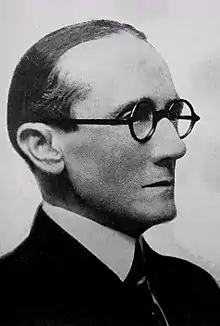Laureano Vallenilla Lanz | |
|---|---|
 | |
| Born | November 10, 1870 Barcelona, Anzoátegui State, Venezuela |
| Died | November 16, 1936 (aged 66) Paris, France |
| Signature | |
Laureano Vallenilla Lanz (November 10, 1870 – November 16, 1936) was a Venezuelan intellectual and sociologist who occupied the presidency of the congress for 20 years during the Gomez regime.[1][2]
Political career
Vallenilla Lanz held a number of positions under the dictatorship of Juan Vicente Gómez and was well known as an apologist for his regime. In his best-known work, Cesarismo Democrático (1919; English title: Democratic Caesarism), he justified the caudillo system by stating that due to the character of the Venezuelan people, rule by a dictator was necessary to maintain public order. In his view, this system was democratic in the sense that it was due to the "unconscious suggestion of the majority".[3][4]
He was for a time the Envoy Extraordinary and Minister Plenipotentiary of Venezuela to France during the 1930s.[5]
Ideology
Vallenilla was "largely responsible for developing a body of historical and sociological theory dealing with issues of race, power relations, and social development". He viewed "the popular masses as a backward and unruly social group" and argued that political leadership needed to be "exercised through the mediation of a popular strongman who would channel the energies of the masses during the transition to a democratic order".[6]
Democratic Caesarism
Specifically, Vallenilla argued that race had no biological basis and ought to be understood as socially constructed, particularly through political projects of nation-making. Vallenilla assailed the notion that racial purity provides moral or political legitimacy.
Death
Vallenilla's funeral was held on November 18, 1936, at the Église Saint-Pierre-de-Chaillot in Paris. The remembrance was led by his son Laureano Vallenilla and other members of the family.[7]
See also
References
- ↑ von Vacano, Diego A. (2012). The Color of Citizenship: Race, Modernity and Latin American / Hispanic Political Thought. Oxford, UK: Oxford University Press. pp. 83–111. ISBN 9780199746668.
- ↑ (in Spanish) "Vallenilla Lanz, Laureano", biography, Instituto Venezolano de Investigaciones Cientificas. Accessed November 20, 2007.
- ↑ pp. 15–17, Rómulo Betancourt and the Transformation of Venezuela, Robert Jackson Alexander, Transaction Publishers, 1982, ISBN 0-87855-450-5.
- ↑ Leo B. Lott, "Executive Power in Venezuela", American Political Science Review 50, #2 (June 1956), pp. 422–441.
- ↑ "Venezuela". Liste de MM. les membres du Corps diplomatique. Paris. July 10, 1935. Retrieved May 12, 2016.
- ↑ Aponte, Pedro Rafael (2008). The Invention of the National in Venezuelan Art Music, 1920–1960 (PDF). University of Pittsburgh. pp. 33–36. ISBN 9781109053203.
- ↑ "Deuils". Le Figaro (in French). November 19, 1936. Retrieved May 12, 2016.